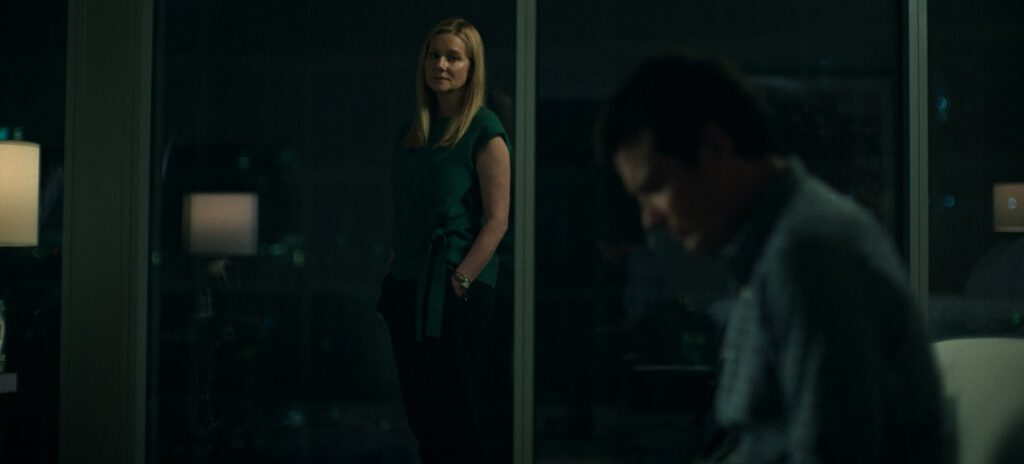“If we do this we will never, ever have to worry about money again. Ever.” That was Marty Byrde’s pitch to his wife Wendy in 2007, when discussing Navarro drug cartel lieutenant Camino Del Rio’s offer to have Marty launder the cartel’s money. The couple are at an expensive resort, hosted by “Del,” wrapped in plush bathrobes in their hotel room, their voices low but light. Marty and Wendy shared a gentle, even sexy, strength in the face of an unknown yet financially stable, future.
It didn’t quite go according to plan.
“Ozark” is a show about balance. Initially the scales had only two weights to consider: Marty Byrde’s (Jason Bateman) bookkeeping finesse and emotional stability versus the Navarro drug cartel’s 50/50 choice of killing Marty or allowing him to launder their money through various businesses in the Ozarks.
As time went on, a bevy of other figures joined the scales, vying for ultimate heft: Wendy (Laura Linney), Marty’s wife, and her consummate disdain for and desire to bend her new life to her will; Ruth Langmore (Julia Garner), an Ozarks native whose intelligence and courage are constantly undercut by her socioeconomic background; Jonah Byrde (Skylar Gaertner), Marty and Wendy’s son, who learned to launder from his dad but has very different ethical principles than his parents. “Ozark” isn’t as flashy a production as “Breaking Bad” or “Mad Men,” or even older series like “The Sopranos” or “The Wire,” but has proven itself just as capable of the writing, direction, and acting on other, more high profile prestige dramas. These last seven episodes of Season Four do not disappoint.

Navigating the delicate nature of power dynamics is integral to Marty’s characterization, and therefore to the writing of the series. The Navarro cartel and their associates conduct crimes, occasionally doling out extreme violence, so Marty must course-correct. Jason Bateman’s performance as a quiet, mild-mannered financial adviser is a study in emotional anchoring. If Marty Byrde seems boring or dull to the audience, it’s because he’s the one holding this entire house of cards together. His body moves casually, but with purpose. Half the time when he’s en route to committing a host of felonies, you’d think he was just heading out to buy eggs or put gas in the car. Bateman’s careful, calming presence takes the audience back to the math: this is a story about the secrets a spreadsheet can hold. Marty is the black coffee-guzzling hangover cure to Wendy’s wild, greedy villainy. This holds true all the way through the finale, and his character’s payoff is just, and, like the man himself, sensible.

If Marty is the yin, then Wendy is the yang. In my review of Season Four’s first seven episodes I said Laura Linney was firing on all cylinders. Somehow, she intensifies her performance in the back half of the final season. A serene, soft, yet unemotional glint lights up her eyes when she’s insulted by a loved one. When she scoffs at others’ fears and anxieties, Wendy’s dismissals land like anvils. Linney delivers Judgment Day-style censures so severe a firing squad would be kinder. By now the audience knows that Wendy Byrde was born and raised in an environment not unlike the Ozarks. Immediately the repulsion caused by the Ozarks gives Wendy demented inspiration. Once upon a time this culture, these values suppressed her, shamed and bullied her. But she’s not Wendy Marie Davis anymore. She’s Wendy Byrde of the Byrde Foundation, formerly laundering money for the Navarro cartel, now a completely legitimate enterprise. It’s not fair to call Linney’s performance a new standard bearer for villainy, because what she’s done in this part holds a Shakespearean richness, but it is inflected with something unidentifiable. Sometimes Wendy’s actions seem tinged by genuine sorrow over her brother’s death, or propelled by love for her children. Sometimes she seems to operate out of pure spite, or unmitigated greed. Most frightening of all—and this is why Linney’s Wendy is an acting hallmark—sometimes there’s nothing behind Wendy’s actions at all. She is an abyss, one that will cause lethal injury just by returning your gaze.
The hardest goodbye for fans will be for Ruth. Julia Garner is gunning for a third consecutive Emmy for her role as a fifth-generation Langmore trying to scrape out a living in the Ozarks, while having to fight every assumption that comes with her poverty, surname, and domicile. Ruth’s many roles in life—a surrogate mother to cousins Wyatt and Three; an ingenious local criminal; an incipient drug cartel member; a strip club owner; a motel owner; a longtime trailer park resident—give her the right to be tired, to just take a load off and not bother with the cartels or Wendy or Marty. But Ruth never gives up. Garner, like her fellow cast members, has perfected a unique body language that speaks even when she is silent. Ruth may have just shot ten different insults at you, her jaw jutting firmly, her hands planted on her hips. If she’s intimidated, her posture won’t change, but she’ll blink. Just once or twice, almost as though her vision is recalibrating along with her judgment. Bateman uses Marty to guide the viewer, to provide a center for the narrative. Linney uses Wendy to clue the audience into the churning, undying lust for power constantly at stake. But Garner uses Ruth to reach through the screen, grab your heart, rip it into shreds, and toss it aside.
Skylar Gaertner has truly held his own as Jonah; we’ve seen him get taller, more serious, quieter, with stronger convictions than everyone around him. Part of this can be chalked up to how well Gaertner was able to play off the actors who served in dad-adjacent roles in Jonah’s life: Uncle Ben (a flawless, heartbreaking Tom Pelphrey) and Jonah had a profound bond, based partly on their, ahem, negative experience of life with Wendy. Buddy Dieker (Harris Yulin), the original owner and eventual basement tenant of the Byrdes’ house, was the closest thing Jonah had to a grandfather. It’s rare to see a character actor part written so well, and Gaertner and Yulin handled this dynamic with care. The experience of losing someone who has given you so much, but is not your parent, is visible in Gaertner’s performance, and “Ozark” is the better for it.

These last seven episodes feature a variety of storytelling methods, including flashbacks, some of which are so painful I could hardly watch, let alone find a way to write about them. None of these sequences are wasted; they simply add color to nightmare periods in the characters’ lives. Fortunately there are two bright spots that shine in the present. Brad Carter plays Deputy Ronnie Wycoff. I cannot say why he appears or what he does, but I can tell you that Carter, best known for his role as the colorful white supremacist prison inmate Charlie Lange on Season One of “True Detective,” is the best part of this final season. As soon as I saw him onscreen I cursed the fact that “Ozark” is coming to a close. There’s no telling what Carter could have done with more episodes, longer storylines. The production designer may have thought so too: there are family photos on Deputy Wycoff’s desk. He does go toe to toe with multiple major characters, not all of whom are his social equals. With some scene partners Carter leans forward or stands stock still; with some his tone veers rapidly from casual to stern; with others he uses jungle cat-like ferocity to belittle and terrify. It’s a testament to the quality of the show’s main cast that they make room for character actors to lend a unique voice to “Ozark” even in the final stretch.
Speaking of making room, Veronica Falcón (“Queen of the South,” “Perry Mason”) joins these last episodes as Camila, mother to Navarro boss-aspirant Javi Elizonndro. With sinuous ease, Falcón slips into this dimly-lit arena of conflicting interests and attains her own power. Dressed only in black silk, Camila’s presence is so elegant you forget how deadly she can be. Add to this dynamic Falcón’s gorgeous voice—which evokes leather, Scotch, maybe a heavy damask skirt climbing a stone staircase—and you can tell you’re in for some quality television, even if just for seven more episodes.












